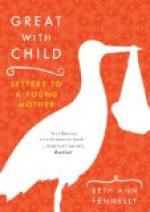One of the most intelligent men I ever knew, frequently made it his boast that he neither laughed nor cried on any occasion; and on being told that both laughing and crying were physiologically useful, he only ridiculed the sentiment.
Crying is useful to very young infants, because it favors the passage of blood in their lungs, where it had not before been accustomed to travel, and where its motion is now indispensable. And it not only promotes the circulation of the blood, but expands the air-cells of the lungs, and thus helps forward that great change, by which the dark-colored impure blood of the veins is changed at once into pure blood, and thus rendered fit to nourish the system, and sustain life.
But this is not all. Crying strengthens the lungs themselves. It does this by expanding the little air-cells of which I have just spoken, and not only accustoms them to being stretched, at a period, of all others, the most favorable for this purpose, but frees them at the same time from mucus, and other injurious accumulations.
They, therefore, who oppose an infant’s crying, know not what they do. So far is it from being hurtful to the child, that its occasional recurrence is, as we have already seen, positively useful. Some practitioners of medicine, in some of the more trying situations in which human nature can be placed, even encourage their patients to suffer tears to flow, as a means of relief.
Infants, it should also be recollected, have no other language by which to express their wants and feelings, than sighs and tears. Crying is not always an expression of positive pain; it sometimes indicates hunger and thirst, and sometimes the want of a change of posture. This last consideration deserves great attention, and all the inconveniences of crying ought to be borne cheerfully, for the sake of having the little sufferer remind us when nature demands a change of position. No child ought to be permitted to remain in one position longer than two hours, even while sleeping; nor half that time, while awake; and if nurses and mothers will overlook this matter, as they often do, it is a favorable circumstance that the child should remind them of it.
Crying has been called the “waste gate” of the human system; the door of escape to that excess of excitability which sometimes prevails, especially among children and nervous adults. To all such persons it is healthy—most undoubtedly so; nor do I know that its occasional recurrence is injurious to any adult—a fastidious public sentiment to the contrary notwithstanding.
Some have supposed, that what is here said will be construed by the young mother into a license to suffer her child to cry unnecessarily. Perhaps, say they, she is a laboring woman, and wishes to be at work. Well, she lays down her child in the cradle, or on the bed, and goes to her work. Presently the child, becoming wet perhaps, begins to cry, as well he might. But, instead of going to him and taking care of him, she continues at her employment; and when one remonstrates against her conduct as cruelty, she pleads the authority of the author of the “Young Mother.”




